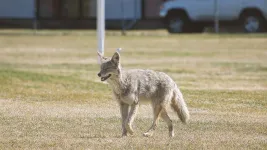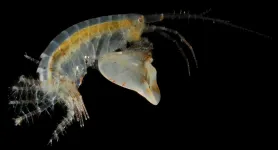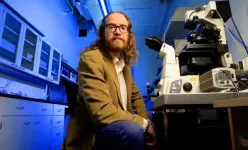Eating human food could mean trouble for urban coyotes, study shows
New U of A research illustrates link between anthropogenic diet, human-like gut bacteria and poor health.
2021-02-25
(Press-News.org) A diet rich in human food may be wreaking havoc on the health of urban coyotes, according to a new study by University of Alberta biologists.
The research team from the Faculty of Science examined the stomach contents, gut microbiome and overall health of nearly 100 coyotes in Edmonton's capital region. Their results also show coyotes that consume more human food have more human-like gut bacteria--with potential impact on their nutrition, immune function and, based on similar findings in dogs, even behaviour.
"If eating human food disturbs the 'natural' coyote gut bacteria, it is possible that eating human food has the potential to affect all these other aspects of coyote health and behaviour as well," said Scott Sugden, lead author and recent master's graduate from the Department of Biological Sciences.
"The gut microbiome has been consistently related to various aspects of human health and behaviour, and the same is true for animals," Sugden noted.
The research also shows that urban coyotes, which eat more human food, also have lower body fat, stressed immune systems and more parasites. The study builds on Sugden's previous research into the relationship between an anthropogenic, or human, diet and the health of urban coyotes.
Urban coyotes that subsist on human food have more human-like gut bacteria--which could affect their health, immune function and possibly even their behaviour, according to a U of A study. (Photo: Colleen Cassady St. Clair)
"If access to human food has the potential to affect coyote health and behaviour by disturbing the gut microbiome, it's important to address the root of the issue by limiting their access to protein-poor human food," explained Sugden.
"This would likely be more effective, and easier to implement, than trying to manage aggressive coyotes and unhealthy coyotes as separate issues," he said, adding that another U of A project will more directly address bold urban coyotes.
INFORMATION:
Sugden completed the research under the supervision of ecologist Colleen Cassady St. Clair and microbiologist Lisa Stein, both professors in the Department of Biological Sciences.
The research was funded by the Natural Sciences and Engineering Research Council of Canada. Collaborators include U of A undergraduate student Kyra Ford and Dana Sanderson from MacEwan University, as well as the City of Edmonton's Animal Care and Control Centre and Animal Damage Control in Sherwood Park.
The study, "An altered microbiome in urban coyotes mediates relationships between anthropogenic diet and poor health," was published in Scientific Reports.
[Attachments] See images for this press release:

ELSE PRESS RELEASES FROM THIS DATE:
2021-02-25
The answer to the age-old mystery of the evolutionary origins of vertebrate eyes may lie in hagfish, according to a new study by biologists at the University of Alberta.
"Hagfish eyes can help us understand the origins of human vision by expanding our understanding of the early steps in vertebrate eye evolution," explained lead author Emily Dong, who conducted the research during her graduate studies with Ted Allison, a professor in the Faculty of Science and member of the U of A's Neuroscience and Mental Health Institute. "Our findings solidify the hagfish's place among vertebrates and open the door to further research to uncover the finer details ...
2021-02-25
Blocking seizures after a head injury could slow or prevent the onset of dementia, according to new research by University of Alberta biologists.
"Traumatic brain injury is a major risk factor for dementia, but the reason this is the case has remained mysterious," said Ted Allison, co-author and professor in the Department of Biological Sciences in the Faculty of Science. "Through this research, we have discovered one important way they are linked--namely, post-injury seizures."
"There is currently no treatment for the long-term effects of traumatic brain injury, which includes developing dementia," added lead author Hadeel Alyenbaawi, who recently completed her PhD dissertation on this topic in the Department of Medical Genetics in the Faculty ...
2021-02-25
INFORMS Journal Management Science Study Key Takeaways:
Changing an employee's hours during their shift, typically by having them stay longer, hurts restaurant revenue.
Checks for parties handled by servers who'd been asked to stay longer during their shift dropped by 4.4%, on average.
Servers asked to stay longer reduced the effort spent on upselling and cross-selling additional menu items.
CATONSVILLE, MD, February 25, 2021 - Short notice versus no advance notice makes a huge difference when it comes to employee scheduling in the restaurant industry. New research in the INFORMS journal Management Science finds checks for parties handled by servers who were asked (with ...
2021-02-25
ITHACA, N.Y. - In many cases, unions in Europe have helped nonunionized workers whose jobs are precarious, according to new Cornell University research.
In "Dualism or Solidarity? Conditions for Union Success in Regulating Precarious Work," published in December in the European Journal of Industrial Relations, the researchers surveyed academic articles to see how often they would find evidence of unions helping nonunionized workers or helping only their own members, and which conditions were associated with each outcome.
The paper was co-authored by Laura Carver, M.S. 20, and Virginia Doellgast, associate ...
2021-02-25
On a low-lying island in the Caribbean, the future of the critically endangered Bahama Oriole just got a shade brighter. A new study led by researchers at the University of Maryland, Baltimore County (UMBC) estimates the population of these striking black and yellow birds at somewhere between 1300 and 2800 individuals in the region they surveyed, suggesting the overall population is likely several thousand. Older studies estimated the entire population at fewer than 300, so the new results indicate there are at least 10 times as many Bahama Orioles as previously understood. The research ...
2021-02-25
A group of crustaceans called amphipods can accelerate as fast as a bullet--literally, according to a new study by biologists at the University of Alberta and Duke University.
This study shows that a tiny and unusual species is responsible for making the fastest repeatable movements yet known for any animal in water.
"The high speeds of these repeatable movements reach nearly 30 metres per second or more than 100 kilometres per hour," explained Richard Palmer, professor emeritus in the Department of Biological Sciences and co-author on the study.
"They have the highest accelerations of any animal in water, reaching more than 0.5 million metres per second squared, which is close to the acceleration of ...
2021-02-25
Glycomics researchers at the University of Alberta and CHU Sainte-Justine have reported a discovery that could lead to new treatments for cardiovascular disease.
The researchers identified a new mechanism responsible for the buildup of plaque on artery walls, a process known as atherosclerosis. This plaque, made up of fats, cholesterol and other substances, can restrict blood flow and is a major factor in cardiovascular disease.
"We identified a new mechanism underlying atherosclerosis," explained Chris Cairo, professor in the Department of Chemistry and co-lead author of the new study. "We also demonstrated that this can be addressed pharmacologically. Using inhibitors ...
2021-02-25
Key takeaways
Opioid prescribing guideline is unique, taking into account each patient's perception of pain, rather than prescribing opioids based on type of operation.
Surgeons play a pivotal role in minimizing opioid use in their patients by setting expectations for pain management.
Opioid disposal rates dramatically increased because surgeons told patients about specific FDA-compliant methods for pill disposal, the location of a convenient pharmacy drop box, and made a reminder phone call.
CHICAGO (February 25, 2021): A prescribing guideline tailored to patients' specific needs reduced the number of opioid pills prescribed after major surgery with researchers reporting ...
2021-02-25
Spring snowmelt in the Alps is occurring earlier in the year due to climate change and as a result triggering abrupt deviations in mountain ecosystems. These changes could negatively affect the functioning of these valuable ecosystems.
New research has demonstrated that vitally important microbial communities within Alpine soils are under threat as a direct result of increasing global temperatures caused by ongoing climate change. These belowground microbes critically support aboveground life because they recycle the key nutrients upon which all animals and plants depend, ...
2021-02-25
Smartphones could be used to scan people's eyes for early-warning signs of glaucoma - helping to prevent severe ocular diseases and blindness, a new study reveals.
Some of the most common eye-related diseases are avoidable and display strong risk factors before onset, but it is much harder to pinpoint a group of people at risk from glaucoma.
Glaucoma is associated with elevated levels of intraocular pressure (IOP) and an accurate, non-invasive way of monitoring an individual's IOP over an extended period would help to significantly increase their chances of maintaining their vision.
Soundwaves used as a mobile measurement method would detect increasing values of ...
LAST 30 PRESS RELEASES:
[Press-News.org] Eating human food could mean trouble for urban coyotes, study shows
New U of A research illustrates link between anthropogenic diet, human-like gut bacteria and poor health.





